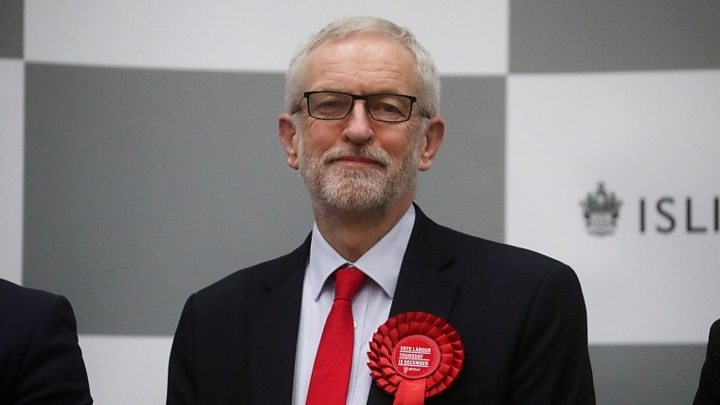Jeremy Corbyn
We are living in highly volatile times. Two-and-a-half years ago, in the first general election I contested as Labour leader, our party increased its share of the popular vote by 10 percentage points. On Thursday, on a desperately disappointing night, we fell back eight points.
I have called for a period of reflection in the party, and there is no shortage of things to consider. I don’t believe these two contrasting election results can be understood in isolation.
The last few years have seen a series of political upheavals: the Scottish independence campaign, Labour’s transformation, Brexit, the Labour electoral surge, and now Johnson’s “Get Brexit Done” victory. None of that is a coincidence.
The political system is volatile because it is failing to generate stable support for the status quo following the financial crash of 2008. As Labour leader I’ve made a point of travelling to all parts of our country and listening to people, and I’ve been continually struck how far trust has broken down in politics.
The gap between the richest and the rest has widened. Everyone can see that the economic and political system is not fair, does not deliver justice, and is stacked against the majority.
That has provided an opening for a more radical and hopeful politics that insists it doesn’t have to be like this, and that another world is possible. But it has also fuelled cynicism among many people who know things aren’t working for them, but don’t believe that can change.
I saw that most clearly in the former industrial areas of England and Wales where the wilful destruction of jobs and communities over 40 years has taken a heavy toll. It is no wonder that these areas provided the strongest backlash in the 2016 referendum and, regrettably for Labour, in the general election on Thursday.
In towns where the steelworks have closed, politics as a whole wasn’t trusted, but Boris Johnson’s promise to “get Brexit done”—sold as a blow to the system—was. Sadly that slogan will soon be exposed for the falsehood it is, shattering trust even further.
Despite our best efforts, and our attempts to make clear this would be a turning point for the whole direction of our country, the election became mainly about Brexit.
A Conservative party prepared to exploit divisions capitalised on the frustration created by its own failure to deliver on the referendum result—to the cost of a Labour party seeking to bring our country together to face the future.
The polarisation in the country over Brexit made it more difficult for a party with strong electoral support on both sides. I believe we paid a price for being seen by some as trying to straddle that divide or re-run the referendum.
We now need to listen to the voices of those in Stoke and Scunthorpe, Blyth and Bridgend, Grimsby and Glasgow, who didn’t support Labour. Our country has fundamentally changed since the financial crash and any political project that pretends otherwise is an indulgence.
Progress does not come in a simple straight line. Even though we lost seats heavily on Thursday, I believe the manifesto of 2019 and the movement behind it will be seen as historically important—a real attempt at building a force powerful enough to transform society for the many, not the few. For the first time in decades, many people have had hope for a better future.
That experience, shared by hundreds of thousands of people, cannot be erased. Our task as a movement, and a party that has more than doubled in size, is not over: it now has the urgent task of defending the communities that will come under sustained assault from Boris Johnson’s government and the toxic deal he wants with Donald Trump.
And it must set about ensuring that sense of hope spreads and deepens. As socialists we seek to raise people’s expectations. People in our country deserve so much more—and they can have it, if we work together to achieve it.
I am proud that on austerity, on corporate power, on inequality and on the climate emergency we have won the arguments and rewritten the terms of political debate. But I regret that we did not succeed in converting that into a parliamentary majority for change.
There is no doubt that our policies are popular, from public ownership of rail and key utilities to a massive house-building programme and a pay rise for millions. The question is, how can we succeed in future where we didn’t this time?
There is no quick fix to overcome the distrust of many voters. Patronising them will not win them over. Labour has to earn their trust. That means the patient work of listening and standing with communities, especially as the government steps up its assault. And it means ensuring that the working class, in all its diversity, is the driving force within our party.
The media attacks on the Labour party for the last four and a half years were more ferocious than ever—and of course that has an impact on the outcome of elections. Anyone who stands up for real change will be met by the full force of media opposition.
The party needs a more robust strategy to meet this billionaire-owned and influenced hostility head-on and, where possible, turn it to our advantage.
We have suffered a heavy defeat, and I take my responsibility for it. Labour will soon have a new leader. But whoever that will be, our movement will continue to work for a more equal and just society, and a sustainable and peaceful world.
I’ve spent my life campaigning for those goals, and will continue to do so. The politics of hope must prevail.
(Jeremy Corbyn is a democratic socialist serving as the leader of the British Labour Party.)




